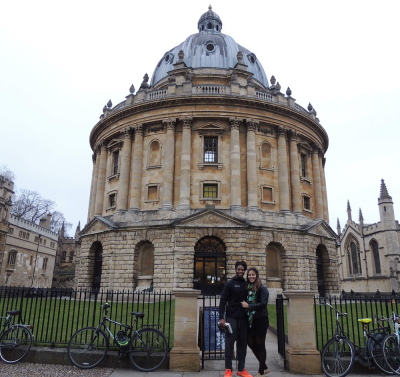Seeking the next Rhodes Scholar from south Los Angeles

I fell asleep during the SAT. My energy was running low by the second section of the test. I rarely had enough to eat back then and didn’t eat breakfast that day. I woke up after about 20 minutes and worked furiously to answer everything I could. For financial reasons, retaking the exam was out of the question.
I grew up in Compton, California, and getting into a good college was my dream – one that could transform my life and help me forge a new legacy. No one in my circle of influence could have helped me navigate college entrance exam preparation. In fact, on the day I fell asleep during the SAT, I had no idea that other students had studied for the exam. Even had I known, I surely would not have been able to participate in the private tutoring and test-prep industry, which is projected to reach $17.5 billion dollars in the United States by 2020. My lack of SAT coaching was apparent in my score.
Many people inside and outside my community saw college attendance as a dream too big for a kid from Compton. Schoolwork is secondary to survival, so many boys like myself were just looking to make it to 18. My dreams could have been derailed by my SAT score. After jumping through the seemingly impossible hoops of my childhood, including policy decisions outside my control, I was fortunate to earn a bachelor’s degree in economics while balancing college athletics and part-time work. Today I’m a Rhodes Scholar and a graduate of the University of Oxford in England with aspirations to become a university professor.
How does a kid get from Compton to Oxford? I am still trying to answer this question myself. Our family struggled against deprivation, but my mom taught us to fight against the racist policies that animated the ‘hood. She reminded us, “We may live in the ‘hood, but that doesn’t mean the ‘hood has to live in us.” Despite my mother’s optimism and the fact that she didn’t measure our worth by other’s standards, a college entrance exam was one obstacle to future college opportunities amid a sea of obstacles.
Recent scandals have revealed that many wealthy parents are ruthlessly determined to see their child admitted to a prestigious university. Though these families can afford private education, tutors and test prep classes, some have employed bribery as well. Not only is this illegal ploy not possible for lower-income families, it reflects a distinctly different valuing of education.
Parents who cheat the system do so to secure the symbolic and social benefits of an elite education. They view an ivy league degree as an accessory to be acquired. Meanwhile families of limited means view higher education as one of the very few paths out of poverty. And as a 17-year-old from a very humble background, a college education represented the possibility of breaking cycles of poverty and the potential for improving the world in my own individual way.
An unimpressive SAT score wasn’t the end of my story and neither was poverty. I’ve met many other students across our beloved nation who are determined to stay in school despite unsavory circumstances. These young people master a range of life skills early on — positive responses to adversity, critical thinking, self-discipline, and empathy. These valuable skillsets cannot be measured by a college entrance exam, but they are vital for college and life success. If university admissions officers could evaluate these skills alongside exam scores, they could admit and unleash a generation of world-changers. David Coleman, CEO of the College Board, has said, “Low scores should never be a veto on a student’s life.” I agree. I am living proof that a student’s potential cannot be quantified by one test.
The College Board, which administers the SAT, recently introduced a tool that may offer a fuller picture of students who live in places like Compton. The “Landscape” tool isn’t a silver bullet, but it can aid admissions officers who want to view students’ academic accomplishment in the context of where they live and learn. Antiracist efforts like this new dashboard help counterbalance a test historically rooted in eugenics. I applaud every effort to level the playing field for lower income students.
It is possible to foster big dreams. It is possible to democratize education and expand quality and access, even for youth living in the ‘hood. I stand alongside millions of Americans working for societal, economic and educational corrections which will ensure more children get a shot at their dreams. I am the first Rhodes Scholar from Compton. I want to ensure that I am not the last.
Caylin Louis Moore is the author of A Dream Too Big: The Story of An Improbable Journey from Compton to Oxford. Caylin grew up in Compton, California. After undergraduate studies at Texas Christian University, he went on to become a 2017 Rhodes Scholar. Caylin is a recent graduate of the University of Oxford, Jesus College, and aspires to become a university professor. Moore and his wife, Paola, have one daughter, Mia.




























